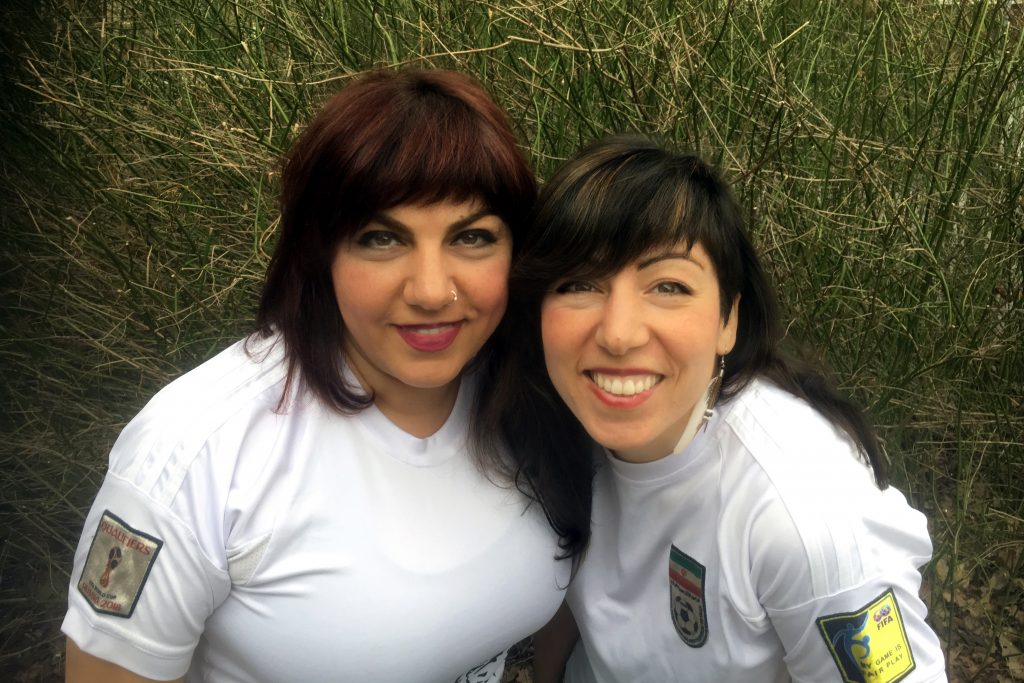CHRI – The world pop band “Abjeez,” Persian slang for “sisters,” was born out of a desire by lead singers Safoura and Melody Safavi to discuss social justice issues in Iran through their music. Influenced by a mixture of styles including Reggae, Flamenco, Ska, and rock, the duo band has released three studio albums since 2007, including several singles.

Abjeez’s newest single, “Stadium,” calls on men to support Iranian women’s struggle to end Iran’s ban on women in stadiums. “For us, music and performance are powerful tools of communication,” Safoura told CHRI in a Q&A. “We believe that music can bring people of different opinions together. It can unite and inspire new ways of thinking and living.”
CHRI: What is “Stadium” about and what inspired you to make this music video?
MS: Since Iran’s Islamic Revolution in 1979, women have been banned from entering soccer stadiums in Iran. This song is about their right to participate as fans in stadiums alongside their male counterparts.
SS: The video portrays a woman and a man, dressed in the Iranian soccer team’s shirts, doing an acrobatic dance to a song that is being performed by Abjeez in a soccer stadium.
The lyrics invite Iranian men to show their support for Iranian women in taking back their right to enter sports stadiums. They also speak about our quest for equal justice in other realms of Iranian society.
MS: We had previously made two other songs—Hameh Baayad Bedoonan (Everyone Should Know) and Merci Team Melli (Thanks Team Melli)—in support of the Iranian soccer team. These songs were very well received by our fans and soon after we were contacted by some Iranian women’s rights activists who asked us to make a song about women’s right to watch soccer games in stadiums in Iran.
CHRI: What does the couple in your video, dancing and wearing an Iranian national soccer jersey, symbolize?
M & S: They symbolize equality, strength, unity, cooperation, passion and completion. A reality that we envision for Iran!
CHRI: Did you experience gender discrimination/segregation growing up in Iran?
MS: Yes. As soon as I started elementary school, boys and girls were separated and the law on the compulsory hijab was passed. So we were forced to wear headscarves in school. Many of the fun activities that were acceptable for boys were not considered appropriate for us girls.
SS: I grew up in Sweden and had a different experience because I was raised in a more open-minded and equal society. However, as an adult I can see patterns of gender discrimination that have followed us like a shadow from the past and still exist even in more progressive societies like Sweden.
CHRI: Is there a difference between gender discrimination in Iran and other countries you have lived in?
MS: Yes, we have been fortunate enough to experience life as women in widely different societies and countries such as Iran, India, Sweden, Norway, Britain, Spain and the United States. Unfortunately, gender discrimination is occurring in all of these societies but in different shades and grades.
In Iran, for example, women’s rights are severely restricted including basic freedoms such as choice of clothing, singing in public, inheriting assets and participating in political leadership. But in modern “Western” countries discrimination is subtler, for example, you can see it in wage and work compensation and the exploitation of women in fashion and media.
SS: As Melody said, discrimination in other countries is less obvious or perhaps hidden within limiting beliefs that exist in every society’s culture and history. We tend to blindly accept these limiting beliefs. Therefore it’s important to constantly educate and challenge ourselves in order to advance and realize our potential as human beings.
CHRI: Your past work also touched on human rights and social justice. Why do you incorporate these issues into your music?
SS: One could say that these issues are the main reasons for our work. For us, music and performance are powerful tools of communication. We believe that music can bring people of different opinions together. It can unite and inspire new ways of thinking and living.
CHRI: How can people outside Iran support the Iranian women’s movement?
SS: By supporting gender equality rights on all levels and by being a voice for those who have to struggle to get their voices heard.
CHRI: Do you feel hopeful about the future of women in Iran?
MS: Yes, we do. Iranian women are at the forefront of the protests. They are extremely strong, fearless and creative.
SS: The question is, are our men ready?
 Shabtabnews In this dark night, I have lost my way – Arise from a corner, oh you the star of guidance.
Shabtabnews In this dark night, I have lost my way – Arise from a corner, oh you the star of guidance.


